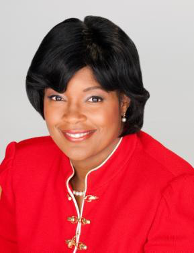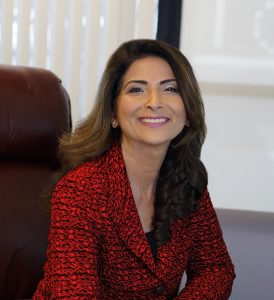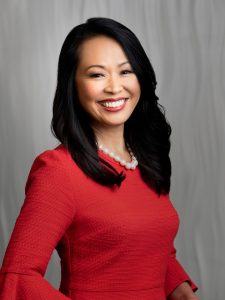#MinorityWomenLEAD | Let’s Talk About Breaking Barriers in 2020
When discussing the challenges women face in the workplace, some acknowledge that many barriers are placed to block their upward mobility into leadership positions. Women— and especially women of color— have to push themselves to “climb the ladder” to the top, but even when they are able to climb that ladder, there is a “ceiling” blocking their path.
There are a variety of “ceilings” that women of color confront:
-
The “Glass ceiling” refers to the invisible barrier and obstacles that keep minorities from rising beyond a certain level of advancement, and from rising to high positions of power.
-
The “Bamboo ceiling” refers to the barriers and obstacles-Asian Americans specifically face in the workplace, including stereotypes and racism, that block their advancement.
-
The “Canvas ceiling” refers to the unseen challenges that refugees face in workforce integration. This is particularly difficult due to the complex factors that stand in their way including but not limited to: immigration regulations, language, qualifications, accreditation, education, and socio-political climates.
Ceilings are the commonly known barriers to advancement opportunities. However, one of the biggest obstacles women face is actually the “broken rung” of the ladder: the manager position. This is especially important, because managers are the first step in upward mobility, and the people selected to receive higher promotion opportunities.
According to McKinsey’s “Women in the Workplace” report in 2019:
-
While women in C-Suite leadership positions had increased by 24% since 2015, less than 5% of women in the general workplace were women of color.
-
About 1 in 5 C-suite executives is a woman—and only 1 in 25 C-suite executives is a woman of color.
-
For every 100 men promoted and hired to manager, only 72 women are promoted and hired. Men end up holding 62% of manager-level positions, while women hold just 38%.
When women are not placed in manager positions, they are often stuck at entry-level positions, hence the “broken rung” in the ladder of their upward mobility. Not only does this exclude them from conversations regarding wage disparity, but it can create an unconscious bias— keeping women at the bottom of the ladder and men at the top of the pyramid. Just as how it is important to have diverse representation in film and television, so too must the corporate workplace reflect equality and inclusion.
We have invited women leaders to speak on their own stories about “Climbing the Ladder and Lessons Learned” as part of our Minority Women Lead virtual conversation series this Friday, August 21. They will be sharing their experiences as leaders, the barriers they faced, and their advice for future generations.
Register today and read more about our panelists below:
 Terrez Marriott Thompson, Vice President of Global Supplier Diversity for The Coca-Cola Company
Terrez Marriott Thompson, Vice President of Global Supplier Diversity for The Coca-Cola Company
“I have been allowed to focus us on truly integrating supplier diversity in the business and being true partners to business and procurement leaders.”
Terrez Marriott Thompson has been a part of The Coca-Cola Company for over 30 years and is equipped with experience in various departments including Operations, Innovation, Public Affairs, and Finance. Her promotion as Head of Supplier Diversity was made in April 2012. Although she was not a Supplier Diversity expert at the time of her appointment, her wealth of business experience has been a key factor to how she leads her department to success. One of her priorities in the company is enhancing Coca-Cola’s Supplier Mentoring Program, which will sustain the company’s supplier-diversity program over time.
 Sue Bhatia, CEO & Founder of Rose International
Sue Bhatia, CEO & Founder of Rose International
Sue Bhatia founded Rose International, a company specializing in workforce and technology solutions in 1993. From an unfinished basement with one desk and one phone, Rose International has grown into one of the largest women-owned businesses in St. Louis, MO, and has been awarded the National Minority Supplier Development Council’s (NMSDC) Regional Supplier of the Year Award. The company ranked #24 on the Staffing Industry Analysts (SIA) list of Largest IT Staffing Firms in the US in 2019.
Bhatia herself is a passionate advocate for women and people of color, and has actively spoken about adaptability and female empowerment at conferences all over the world, and as a podcast guest of Women Worldwide and The Small Business Radio Show. She was inducted into the SIA Staffing 100 Hall of Fame in 2017, the first female minority business owner to serve on the NMSDC’s board of directors, and won the 2019 Trailblazer Award from the WBE Hall of Fame.
 Lisa Chang, Senior Vice President & Chief People Officer of The Coca Cola Company
Lisa Chang, Senior Vice President & Chief People Officer of The Coca Cola Company
“Behind the world’s most iconic brand are the world’s most passionate people.”
Before Lisa Chang joined Coca-Cola in 2019, she served as Senior Vice President and Chief Human Resources Officer for AMB Group LLC in Atlanta. She is an industry veteran backed by over 26 years of experience and has brought that into her role overseeing Coca-Cola’s global human resources operations. She has worked with other companies such as Turner Broadcasting, Equifax, The Weather Channel and more, in high leadership positions with complex responsibilities.
 Linda Shim, Executive Director of External Affairs at Comcast
Linda Shim, Executive Director of External Affairs at Comcast
“Follow your heart and don’t give up. I’ve loved every job I had working for the House of Representatives. Each role gave me an opportunity to address problems and contribute in different ways.”
Linda Shim is well known for her previous work as Chief of Staff to Congresswoman Judy Chu (CA-27), who delivered Special Remarks at our Minority Women Lead Kick Off [link to recording here]. She currently serves as an Executive Director at Comcast, hoping to bridge the public and private sectors together and create effective policies for both realms. Her current role in the company is to act as liaison between Comcast and external stakeholders, including AAPI policy and political organizations. Her extensive experience in government policies brings a much-needed game-changing perspective to affect change in the large company.
 Tina Wei Smith, Executive Director of White House Initiative on Asian Americans and Pacific Islanders (WHIAAPI)
Tina Wei Smith, Executive Director of White House Initiative on Asian Americans and Pacific Islanders (WHIAAPI)
Tina Wei Smith was appointed as the 8th Executive Director of the WHIAAPI on December 9, 2019. One of her extensive duties will be advising federal agency leadership on implementing and coordinating with federal programs relating to AAPIs across the federal government. The WHIAAPI was created to broaden AAPI access to economic resources and opportunities, empowering them to improve their lives and their communities. Smith has previously worked at the The Heritage Foundation in the Office of Distinguished Fellow, the U.S. Department of Labor, and the U.S. House of Representatives. She also served as the first Director of Global Engagement Office at Asbury University, creating new international education initiatives and curriculum to help students prepare for the expanding global economy.
Share on Social Media
Recent Posts
Press Release: California and Sacramento Asian Pacific Chambers of Commerce Name New Vice President of Public Policy
CALIFORNIA AND SACRAMENTO ASIAN PACIFIC CHAMBERS OF COMMERCE NAME NEW VICE PRESIDENT OF PUBLIC POLICY SACRAMENTO, CALIF. (April 22, 2024) — The California and Sacramento Asian Pacific Chamber of…
April 22, 2024
Press Release: Governor Newsom Signs Assembly Bill 258 into Law
Democratizing State Resources to Empower Minority-Owned Businesses in California SACRAMENTO, CALIF. (October 11, 2023) — The California Asian Pacific, African American and Hispanic Chambers of…
October 11, 2023
Press Release: CA’s Minority Entrepreneurs to Receive Millions in Investment Capital to Support State’s Move to a Low Carbon Future
Electrify California Program” Funding Announcement Part of Historic Investment by Biden-Harris Administration to Help Disadvantaged Entrepreneurs SACRAMENTO, CALIF. (August 9, 2023) — Minority…
August 9, 2023



